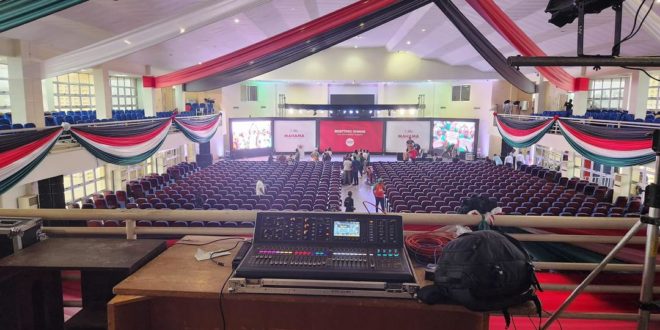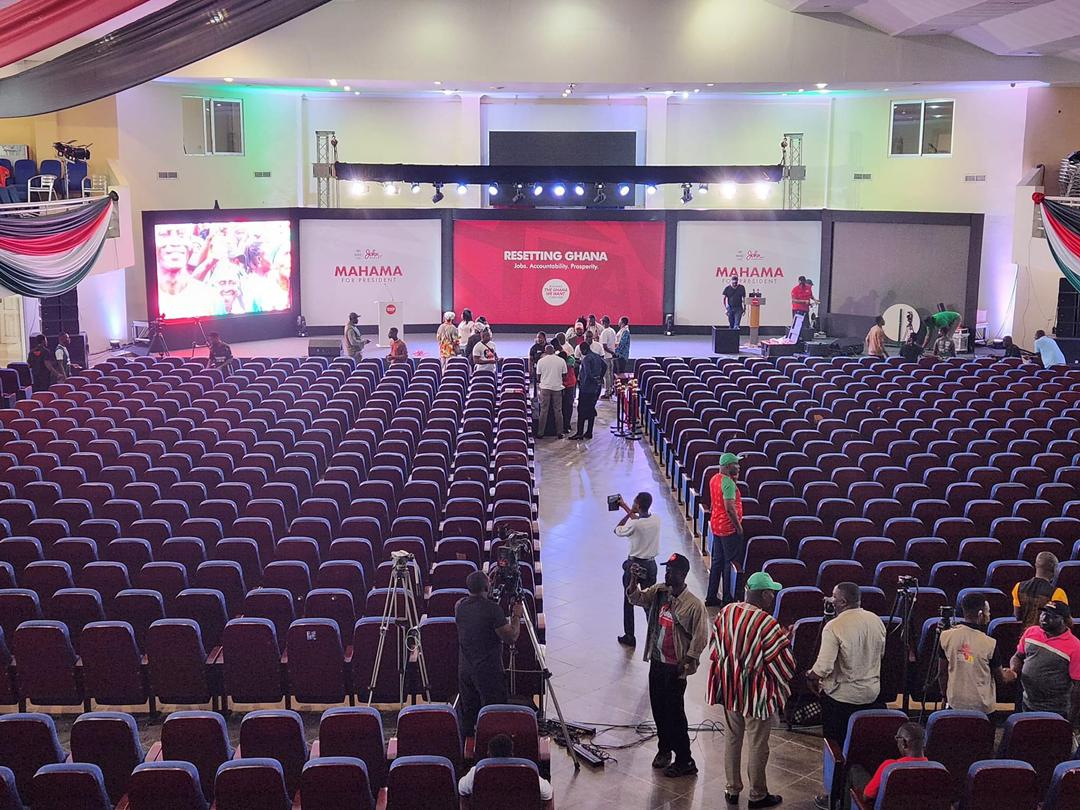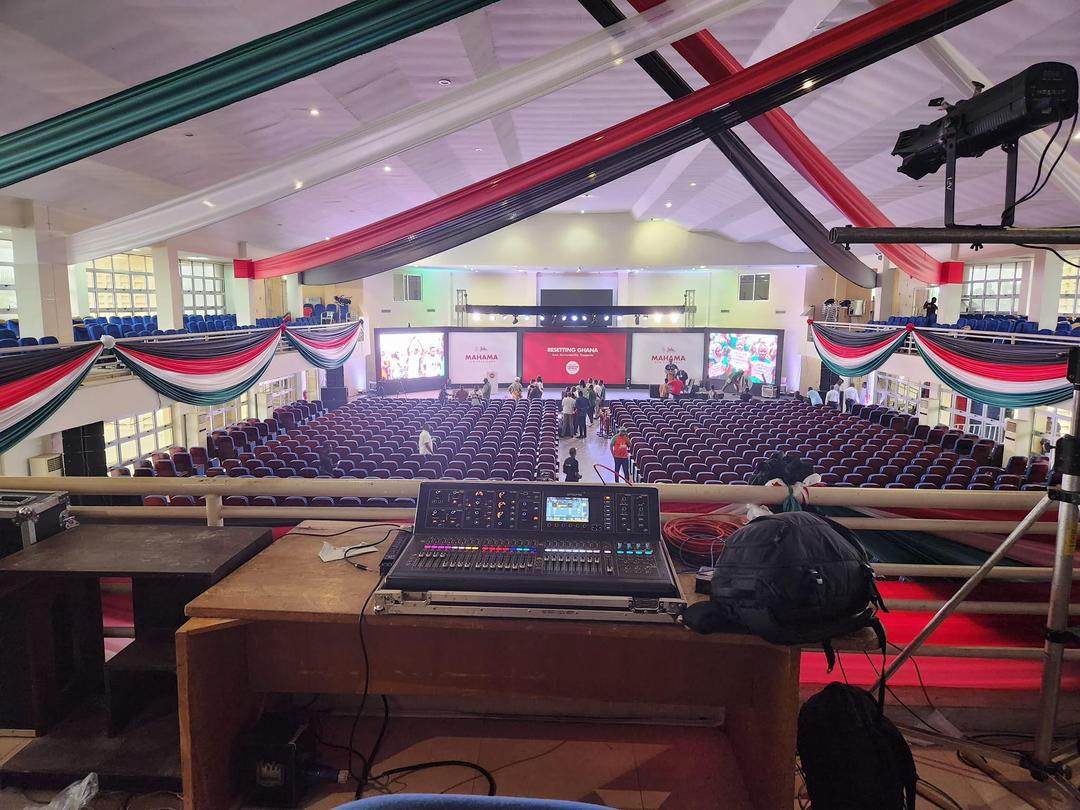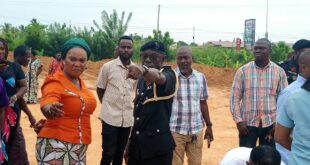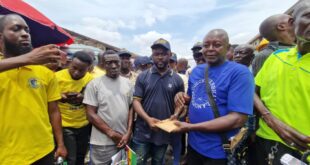Thousands of National Democratic Congress (NDC) supporters are expected to be in Winneba of the Central region for the 2024 manifesto launch.
The event scheduled for noon will be held at the Jophus Anamuah-Mensah Auditorium of the University of Education, Winneba(UEW).
The event will have the flagbearer and former President John Dramani Mahama as the special guest.
The party’s National Executive Committee members, members of the Council of Elders, Members of Parliament, Parliamentary Candidates, members of the Diplomatic Corps, Clergy, “Nananom”, Civil Society Organisations, Academia, Labour Organisations, Creative Arts, will also be in attendance.
To ensure the success of the upcoming event, the party has formed a 9-member Manifesto Launch Planning Committee, which will oversee all aspects.
The manifesto launch is under the theme ‘Change To Reset Ghana’.
Watch the stream below:
Click on the link below
https://www.facebook.com/share/v/WueeUU3icb1zjJw7/?mibextid=oFDknk
Here are highlights of the document as intercepted by 3news:
Economy
The manifesto aims to eradicate extreme poverty, restore inclusive growth, stabilize the Ghana Cedi, and create jobs through the One Million Jobs, EDWUMA PA Plan.
It targets low inflation, sustainable GDP growth, and public debt management, ensuring that government financing does not crowd out the private sector.
There are plans to reduce public debt and improve fiscal sustainability through prudent financial management.
A $10 billion ‘Big Push’ infrastructure plan is proposed to develop roads, hospitals, and other critical infrastructure, which will boost economic activities and create jobs.
The manifesto supports indigenous businesses with tax incentives and legislative backing, promoting greater Ghanaian ownership in sectors like banking, insurance, and construction.
Sector-specific strategies are highlighted, focusing on agriculture, pharmaceuticals, health tourism, manufacturing, and ICT to create jobs, boost exports, and drive economic growth.
It promotes digital innovation and entrepreneurship to stimulate the economy and support domestic manufacturing.
The manifesto addresses economic disparities by promoting Local Economic Development (LED) to ensure equitable growth across all districts.
Jobs/Employment
The manifesto targets the creation of 250,000 jobs annually through the “Edwuma Pa” programme, focusing on sustainable and well-paying jobs.
It emphasizes aggressive training and skill development through programs like STEP-UP and the Free National Apprenticeship Programme.
Support for the private sector includes development financing, business advice, and long-term credit options for equipment upgrades.
District assemblies will be required to develop Integrated Employment Frameworks focused on private-sector job creation.
An Employment Act will be introduced to track job creation and monitor the impact of government policies, supported by a Labour Market Information System (LMIS).
The Youth Employment Agency (YEA) is emphasized as a key player in expanding opportunities for youth employment.
A three-shift economy is promoted in the manufacturing sector to increase employment opportunities by allowing companies to operate 24/7.
Public employment programs, such as military and police youth farms, are proposed to offer job training and employment opportunities.
Mechanisms will be established to support startups and existing businesses in priority sectors, helping them meet standards and penetrate local and international markets.
Agriculture & Agribusiness
The manifesto focuses on enhancing the production and productivity of key crops like maize, rice, yams, beans, and others to boost food security and create jobs.
It promotes value addition in agriculture through postharvest management, increasing the nutritional value of crops and creating jobs, especially for women and youth.
There are plans to tackle challenges in the rice value chain to achieve and sustain national self-sufficiency in rice.
The manifesto supports the poultry industry by promoting the production of yellow maize and soybeans.
Infrastructure and logistics will be mobilized to ensure sustainable vegetable production throughout the year and reduce imports.
Cocoa Sector
Cocoa farmers will receive free primary healthcare and exemptions from NHIS premiums for secondary and tertiary care.
The Cocoa Roads Project will be revived and expanded to cover more cocoa-growing areas, with all abandoned projects resumed.
A pension scheme will be established for cocoa farmers to ensure financial security in their old age.
The manifesto guarantees consistent annual increments in the cocoa producer price to make cocoa farming more attractive, especially to the youth.
It ensures that no female cocoa farmer is left behind by supporting access to extension services, agro-inputs, and participation in cocoa farming programs.
The Youth in Cocoa Programme will continue to encourage young people to engage in cocoa farming through support and the free Hybrid Seedlings Programme.
Healthcare Programme
Implement a well-funded and efficient Free Primary Health Care programme for all Ghanaians.
Promote preventive care and wellness to reduce maternal mortality by 50%.
Introduce incentives for antenatal care to support maternal health.
Amend the law to provide four months of maternity leave and seven days of paternity leave.
Provide free sanitary pads to girls in school to support their education and well-being.
Train more personnel in domiciliary and palliative care, establish exercise parks and recreational centres for the elderly, and amend the National Health Insurance Act to exempt persons aged 65 years and above.
Establish a Patients’ Protection Council to fully implement the Patient’s Rights Charter.
Reduce the cost of medicines through ‘framework contracting’ and provide free anti-snake serum.
Establish a Cancer and Kidney Disease Trust Fund, declare renal failure, diabetes, and hypertension as national health emergencies, and improve access to affordable treatment.
Reward healthcare workers who accept postings to rural communities with a five-year work abroad programme.
Strengthen public health education and promotion, focusing on healthier sexual behaviors and family planning among persons of reproductive age.
Health Infrastructure
Transform all regional hospitals into teaching hospitals to enhance healthcare quality and access.
Complete abandoned health facilities, including those in Tepa, Akatsi, Kumawu, Abetifi, and Garu.
Construct two new Police Hospitals in the middle and northern zones.
Expand the 37 Military Hospital to increase its capacity.
Build and equip CHPS compounds in electoral areas for disease screening and better antenatal monitoring with ultrasounds.
Equip district hospitals with blood banks, infectious disease units, and advanced equipment like CT scans and MRI machines.
Establish stroke units in regional hospitals and oncology centres in the northern regions.
Complete Phase III of the University of Ghana Medical Centre and Phase II of the Greater Accra Regional (Ridge) Hospital.
Collaborate with the private sector to establish state-of-the-art rehabilitation centres for addiction and emotional trauma.
Scale up the training of emergency physicians by extending training programs to key hospitals like Korle Bu and Ridge Hospital.
Capacity Building for Health
Employ the backlog of qualified health professionals and provide insurance to cover risks associated with their practice.
Support bilateral and exchange programs to expose health personnel to global best practices.
Institute a National Health Workers’ Day and establish an award scheme for deserving individuals and facilities.
Ensure the safety and protection of healthcare workers and patients.
Establish the Professor Jacob Plange-Rhule Endowment Fund for medical and surgical specialist training.
Develop a plan to establish the Ghana College of Nurses and Midwives.
Improve incentive packages for health professionals, especially in underserved communities.
Implement tax waivers to assist health workers in acquiring transportation and establish a housing scheme with residential facilities at health centers.
Expand training programs for Physician Assistants, emergency physicians, and paramedical staff through the National Ambulance Training School.
Develop a comprehensive Public Health Emergency Preparedness Policy.
Establish a National Imaging Reporting Centre (NIRC) for electronic reports in hospitals without radiologists.
Construct regional hospitals in the six new regions and the Western Region, and provide additional district hospitals where needed.
Set up two National Infectious Disease Centres.
Integrate psychiatric care with sufficient funding in regional hospitals and develop Pantang Mental Hospital into a premier mental health facility.
Develop strategies to reduce healthcare costs by promoting local production of pharmaceuticals, medical devices, and diagnostic test kits.
Collaborate with Traditional Herbal Medicine Producers for integration into Ghana’s health system.
Establish a Medical Laboratory Science Council to regulate and promote quality standards in practice.
Redeploy the abandoned ‘Onua Dor’ Mobile Clinic Vans and reintroduce the ‘Onipa Nua’ Hospital Ship to serve hard-to-reach communities.
Teacher Motivation
Revisit and make functional the agenda of providing special incentives for teachers in rural and deprived communities.
Increase the teachers’ retention premium.
Train and motivate teachers and caregivers in special schools.
Abolish mandatory national service and teacher licensure examinations for graduate teachers.
Restore automatic employment for newly trained teachers.
Fast track promotions and applications for academic progression.
Open special credit lines to facilitate access to loans for teachers.
Provide teachers with free tablets to enhance teaching and learning.
Collaborate with teacher unions to implement a special regime for teachers to own vehicles under affordable terms.
Reinstate the payment of responsibility allowances to teachers.
Basic School Education
Expand and refurbish educational facilities to meet 21st-century education standards.
Provide necessary support and incentives to keep all eligible children, especially those in underserved areas, in school.
Increase the budgetary allocation to basic education to improve teaching and learning activities.
Provide pre-school facilities closer to markets, ministries, and city centers to ease the child-care burden on mothers.
Encourage private sector investment in pre-schools and recreational facilities for employees.
Ensure quality learning through proper teacher allocation, improved pedagogy, appropriate learning spaces, and effective supervision and support for teachers.
Remove Comprehensive Sexuality Education from the school curriculum.
Create opportunities for early visual and audio screening to support children with special needs.
Offer education opportunities to out-of-school children while encouraging the right entry age for school.
Extend Complementary Basic Education to market women, commercial drivers, laborers, and head porters with flexible school hours to enhance literacy, numeracy, self-esteem, and responsible citizenship.
Increase engagement with schools through community commitment and efficient use of existing structures.
Set up a panel of experts to assess the current curriculum, improve standards, address distortions, and bridge the quality gap between public and private basic schools.
Rapidly roll out modern technological learning tools, including blended learning and IoTs, to transform education at this level.
Restore Arabic studies to the curriculum and recruit Arabic teachers to lift the current ban.
Secondary Education
Improve the Free Senior High School Programme by addressing challenges and raising standards.
Expand the Free SHS programme to include students in private Senior High Schools in underserved/deprived areas.
Abolish the double-track system.
Complete abandoned structures for secondary and technical education, including E-Blocks.
Strengthen and sustain private sector participation in secondary education.
Ensure newly created regions have functioning directorates of education.
Start constructing at least one Senior High School in districts without one.
Establish schools in disadvantaged, over-populated, and underserved areas, including Zongos and other deprived communities.
Expand existing successful schools to accommodate more students, including Ghanaians abroad.
Promote the use of IT and provide free Wi-Fi in schools to enhance student performance.
Provide students and teachers with free tablets loaded with relevant content for teaching and learning.
Equip all secondary schools with computer laboratories.
Address challenges with the Computerised School Selection and Placement System (CSSPS).
Decentralize and strengthen procurement of food and materials to SHS heads and their bursars.
Provide residential facilities in schools for teachers and educational staff.
Restore free expression and eliminate intimidation among stakeholders.
Scale up the provision of free sanitary towels to needy and vulnerable females to keep all girls in school and improve their health and well-being.
Good Governance, Anti-Corruption, and Accountability
Address nepotism and corruption head-on with bold measures to combat these issues.
Restore integrity and strengthen independent anti-corruption institutions.
Build strong institutions by ensuring adequate funding and hiring well-qualified staff with proven integrity for anti-corruption agencies.
Empower and resource the office of the Special Prosecutor and other anti-corruption bodies.
Introduce legislation to regulate agency representation and business practices of multinational companies.
Review and strengthen guidelines for political office holders.
Promote personal trust and integrity in leadership for national development.
Support public accountability by encouraging citizens to act as watchdogs and ensuring the Presidency does not shield corrupt appointees.
Operation Sting
Launch “Operation STING” as part of the Integrity for Development Action Plan, involving comprehensive government reforms.
Codify conflict of interest situations for public officials and enforce applicable sanctions.
Make single-sourced procurement an exception rather than the rule.
Introduce conflict of interest, moral, and civic education in high school curricula.
Enact conflict of interest legislation for all government officials, including the executive and legislature.
Increase support for anti-corruption institutions like EOCO, NACOB, and the Financial Intelligence Centre.
Strengthen collaboration between NACOB and the Food and Drugs Authority.
Safeguard the independence of the Auditor-General’s Office.
Good Governance
Address issues of nepotism, state capture, and suppression of freedoms seen under the NPP Government.
Investigate corruption scandals such as PDS, BOST, and the Agyapa Royalties Scandal.
Review and reduce the size of the government, including the number of ministers and political appointees.
Establish a framework for well-resourced, accountable state institutions.
Create a proactive Public and Civil Service to support economic growth, rule of law, and transparency.
Protect state institutions from undue politicisation.
Restore public confidence and integrity in governance and public administration.
Promote public-private investment and a culture of national discipline and result-oriented public service.
Conduct regular audits and sanction improper conduct.
Implement strict accountability and ethical measures to combat corruption and state capture.
Parliamentary Independence and Accountability
Encourage MPs to prioritize and promote the collective interest of their constituents and the State.
Follow up on the Constitution Review Committee’s recommendations regarding the appointment of Ministers from Parliament.
Build consensus among political parties on national issues and avoid political vindictiveness.
Enhance the capacity of MPs and parliamentary staff to improve oversight mechanisms.
Judicial Independence and Accountability
Pass legislation to allow the Judiciary to use a percentage of its Internally Generated Funds to establish a Court Development and Rehabilitation Fund.
Support the Judiciary in establishing High Courts in newly created regions and Courts of Appeal in Western, Northern, and Volta regions.
Build digital and manual legal libraries and increase resources for the Ghana Legal Aid Commission.
Resource the Council for Law Reporting to regularly produce Ghana Law Reports.
Local Governance and Decentralisation
Pay Assembly Members.
Upgrade selected Municipal Assemblies and District Assemblies to Metropolitan Assemblies.
Increase the District Assembly Common Fund (DACF) from 5% to 7.5% of national revenue.
Assign certain administrative services and revenue collection to district assemblies and remunerate Assembly Members accordingly.
Implement the recommendations of the Constitution Review Commission on Local Government and Decentralisation, including the election of MMDCEs.
Reassign traditional local government functions back to MMDAs.
Build modern waste recycling facilities and reintroduce the National Sanitation Day.
Establish a Municipal Bond for rural development and create a Waste Management Fund to address waste management and create green jobs.
Introduce a Housing Revolving Fund for affordable housing loans.
Enact and implement the Local Government (District Assemblies Borrowing) Act for MMDAs to access resources for development.
Support small-scale entrepreneurs and decentralise births and deaths registration.
Design a resourcing package for newly-created regions, including establishing Regional Hospitals, Public Universities, and Public Technical Universities.
Amend the Constitution to include chiefs and traditional authorities in MMDAs and establish a Royal Institute for Chiefs and Traditional Authorities.
Amend the DACF Act to provide block transfers to accelerate development in the regions, especially newly created ones.
THANK YOU for constantly reading stories on MyGhanaMedia.com, a news publishing website from Ghana. Kindly like, follow, comment, and SHARE stories on all social media platforms for more entertaining updates!
Follow us on Twitter: https://twitter.com/
Source: MyGhanaMedia.com
There are four types of content published on MyGhanaMedia.com daily: curated content; syndicated content; user-generated content; and original content.
 MYGHANAMEDIA.COM Best Source Of Latest News
MYGHANAMEDIA.COM Best Source Of Latest News
